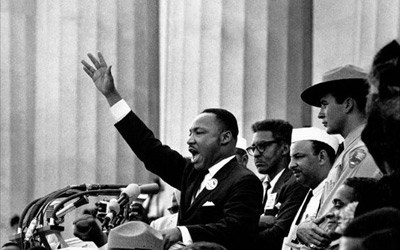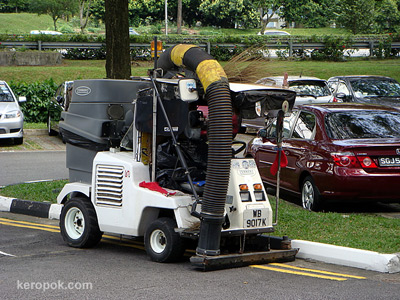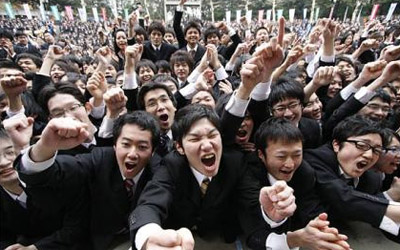Dreams are not for Asia

There’s a pretty good essay on Prime Minister Lee Hsien Loong‘s call for young Singaporeans to “dare to dream” over at The Online Citizen. The gist of it is that this statement is highly ironic when interpreted against the realities on the ground, much of them the results of government policy. Predictably, the comment section is filled with comments that miss the bigger picture of the issue and see this as another scheduled anti-government ranting session, with the few thoughtful comments voted down.
The government is no doubt a part of the problem, but it is the mentality of Singaporeans at large that has created a hostile environment for socially deviant dreams to take hold, and the same can be said for many Asian societies.
As Westerners love to say, Asia is coming richer and richer. The rise of Japan, the Four Asian Tigers, China and India were/are the stables of any economics review. But rapid economic development brings with it deeply rooted social problems that go beyond stress or corruption. Whereas Western societies has had two hundred years and two World Wars to adapt their cultures to fit an industrialized world, Asia is attempting to do the same in the post-colonial era barely half-century old. Some say that Singapore is a successful example of such an endeavour, and they are right in many ways.
Singapore is recognized by the IMF as an “advanced economy” and by the World Bank as a “high income economy”. It also ranks 28 on the Human Development Index, in the neighbourhood of Slovenia and Kuwait. By most measures of national success, Singapore, a country literally just over four decades old with no prior geopolitical equivalent (e.g. China is technically 60 years old but existed as a country long before that), is an exemplary one.
But due to the sheer speed of its development, its overnight transformation from third world to first world took place without a corresponding advancement in social values. Unlike the economy, development of social values cannot be fast tracked even by the most efficient governments, try as they might.
Foreigners visiting Singapore love to comment that it is a clean and beautiful place. The reality is that it is clean and beautiful because we have legions of imported workers who clean the roads of trash, sweep away the fallen leaves and repaint the chipping paint jobs every night and morning. In this case, economic success has allowed us to produce the appearance of social enlightenment. So hurray for us.

The reason why we have clean roads. Taken from The Keropok
However, developing a conducive environment for young people to chase after their aspirations is another ball game altogether. Asians in general are stuck in the survival state of social mentality. Having only recently climbed up the economic ladder, we are still shackled by the idea that money is everything in life.
Our uneducated grandparents worked hard to buy a house and send our parents to school. Our parents worked hard to buy a bigger house and a car and send us to a better school in that car. With even better education and opportunities available to us, we are then expected to earn even more money than our parents. The survival instinct that drove our grandparents to sustain their family has become the consumer instinct for bigger and better.
In a sense, the rise of consumerism has always been a point of debate in developed nations, but in Asia’s case it comes with added baggage — the idea that as our economies grow, our lives should be measurably wealthier. Material possessions are therefore the measures we have for successful development as a society. Our list of “necessities” in life is ever expanding and the bar for “success” is ever rising.
And this idea that our survival depends on economic success is what drives government policies. Some say that it is the result of government policies, but it’s really a chicken-and-egg issue. Society and government both agree on this idea and they mutually reinforce each other through their actions. The word “pragmatic” describes Singapore more than any other. Through the tinted lens of pragmatism, we see and judge every aspect of our lives.
An education is not a pursue of knowledge. To be educated is to become a more highly valued member of the workforce and knowledge is only relevant as a mean of achieving that goal. Interests are distractions from a successful education and the career that follows. Literature, history, philosophy and art are all non-practical subjects of study — risky options that only the rich can afford. Subject combinations should be chosen to match future career paths and not interest. Careers should be chosen based on a logical examination of supply and demand, chances of success and likely degree of success, not interest. Dreams are for the naive and real adults do cost-benefit risk analysis. Such is the life of a student going through the motions in Singapore.
The upside of this is a heavy emphasis on foundational education in Singapore. This is why we do so well in international math and science competitions. The downside of this is a dearth of culture. This is why we do so poorly in journalism, literature, art, music and almost everything else. For you see, the only kind of culture that is worth anything is the kind that brings in tourist money.
We applaud people who are successful businessmen and entrepreneurs, but talented musicians are just fascinating sideshows who will one day realize that they have wasted their lives away on the “wrong” career. Business, medicine and law are the officially recognized paths to success in university, and every other subject is for people who failed to get into one of the three and foreign students.
Japan’s university system is perhaps the pinnacle of an education system designed to produce productive workers. Come spring every year in Japan, a new batch of university graduates don identical looking suits and enter the job market to become salarymen and office ladies. The sight of the endless streams of similarly mannered people walking in and out of a busy metro stations rushing to work induces an overwhelming feeling of hopeless futility. This is the Asian equivalent of US suburbia.
Jump through the hoops, follow the markers correctly and be rewarded with a lifetime of comfort and luxury. We treat ourselves and our next generation no better than dogs.

We are all special!
Don’t get me wrong, I have nothing against capitalism or even consumerism. I am certainly not advocating that we go back to farming and self sustenance. In fact, I am arguing for the exact opposite: thanks to economic development and industrialization, it is now easier to earn a living than ever before and, instead of spending every waking hour tending to the crop fields, we now have free time to pursue our dreams and still feed ourselves. But that’s not what we are doing. We are instead pursuing the dreams of our parents and grandparents — to live a richer life than the ones before us.
One of the fundamental ideas of economics is the value of comparative advantage — the idea that the greatest net gain can only be achieved when we specialize according to our natural advantages.
The problem with Singapore and many Asian countries is that “gain” is measured only in terms of monetary value. The natural advantage of a talented artist is not given its due credit for its bettering of society at large and therefore goes under-rewarded. Those of us whose talents are not in the “correct” domains are naturally doomed to practise bad economics by pursuing careers in less ideal but more socially accepted fields, hence contributing less to society than we are inherently capable of.
It is sad that talented musicians relegate their interests in favour of pursuing business or law. But what’s even sadder is that many Singaporeans do not see a need for having interests and do not seek to discover their own talents. The real tragedy is not people being forced to consciously make difficult but understandable practical decisions between passion and financial stability, but the fact that an even greater number of people are not even aware that there is such a choice to be made.
The rat race is so deeply engrained in our collective mindset that we do not bother to seek alternate paths to success. It is one thing to explore the wilderness before returning to the well-beaten track, but another altogether to not even try. How can we dare to dream when we have no dreams but the one we inherited?

These people had no opportunity to discover their talents but we do
Some people say that our lives are too short to be spent on potential failures over guaranteed success, but I say that our lives are too finite too be spent on not trying. We all die eventually and the worst that can happen is nothing — we return to the grind and continue as always.
And ultimately we don’t live in the Dark Ages any more — we are not choosing between survival and everything else, but between a bigger house and pursuing our dreams. And the two are not even mutually exclusive: time and again it has been shown that actively pursuing one’s interest and making full use of one’s unique talents can and do lead to economic success.
Ahhh, good old meritocracy… It only works for results that can be measured quantitatively.






October 2nd, 2009 at 1:53 am
Well I am working and it is really sad to see people in a job that they have no passion for. They work like zombies and slow down progress.
I find that a lot of Singaporean students choose their careers based on what is in demand as stated by the Singapore government. Unfortunately we live in a small country where everything is planned out and workers are needed to drive the economy and we have to adapt constantly to the trends of the rest of the world.
I believe that any job can earn you big bucks as long as you work hard and put in your passion and effort. Even the unpopular ones that everyone shuns. As long as you are a pioneer in your field.
But it also depends on what you pursue in life and your expectations. If you want more, then sometimes its harder to achieve your goals and more sacrifices have to be made.
In the end, everyone has to find his own balance of dreams and reality. And that can change as we grow as the world around us is constantly changing too.
October 2nd, 2009 at 3:37 am
Great article, see I told you the good old army’ll beat out all the good latent articles you have inside.
Everytime I look at an article about such a topic, chances are, the comments’ll be full of nonsense from semi-literate idiots ranting on how the government has failed them. I find almost all the 51 comments before this rather great as well and a fitting discussion to follow the initial article. So thanks, guys from various nations. Most such discussions on Singaporean-only sites devolve into mudslinging sessions between the anti-government sheep “why the gahmen no give me money?” and the moderates, who are able to acknowledge the achievements of the PAP without totally agreeing with their methods. I don’t think there are any staunch PAP supporters left below the age of 30.
I’m pretty sure this “Mature” guy is an imaginary friend DM conjured up to stimulate discussion, because no “mature” guy busy feeding his family’ll be reading an anime blog.
October 6th, 2009 at 12:38 am
I agree with your article, but I think I might know why our education system is as such.
I’m sure the upper echelons of our ministry of education has gone through the same thought process as you did before implementing whatever schemes they have for Singapore’s future. The thing is, not all of us have the ability to make it far in our area of interest; you might be really good at drawing, but somebody out there is even better, and chances are there is another somebody that is even better than that guy. You really have to be the cream upon the cream of the crop in order to make a name for yourself in the field of arts or music or literature.
Singapore is a really small nation. With a population of only nearly five million, the probability of producing an exceptional talent is probably infinitesimal. Well you can compare the level of competency of our talents using the talent/game shows which are common in both our country and much larger countries, given that they are a somewhat accurate representation of talents in their respective countries. We just can’t match up.
Like you said, high risks yet low returns. Our education system actually safeguards us from falling into our own trap, albeit in the process sacrificing any advancement in our culture. Additionally, to have a single, distinct and true culture in Singapore will be somewhat tricky given our multiracial and religious nature.
Practicality being the forefront of everything we do in Singapore, there’s no surprise that there is little emphasis on “low returns” fields of study. The only redeeming point is perhaps how every student, sometime during their education, is required to study a ‘critical thinking’ subject such as a humanities or general paper. Hopefully, these subjects will provide students, however little it may be, a different perspective and serve to inform them about this ‘choice’ that they have and should consider about.
If someone really has what it takes to make it big, then probably nothing can go between him and his dreams, not our education and sometimes not even the military.
Just a side note, I’m not from MOE or PAP or anything. I just feel that what we think might be the right way might not necessarily mean it’s the correct way, and maybe we’re really still too naïve to understand the mechanisms of society to make a judgment.
I still do agree with you though. =)
(By the way, I realized that your articles actually make good education material, especially how you make the effort to hyperlink jargon and other unknown stuff.)
October 8th, 2009 at 8:34 am
“Modern western economy is nothing short of slavery.”
You mean life?
Sorry, but in reality, there is only one true purpose to life; passing on our genes to the next generation.
Just as people from times long ago worked to build a sustainable home, family, and job, people do the same today. Did the farmers of the Middle Ages have the luxury of studying the arts and literature? No, they worked to feed themselves and their family.
It’s been this way forever. Life isn’t slavery, and they very fact that we have the free time now to explore other fields outside of our work puts our standard of living far above that of ANY human from any other time period.
October 8th, 2009 at 8:24 pm
If this was a GP Essay, i’d give it 41/50. Language is thorough and content is focused, extremely ‘to the point’. Scratch that, make it 48.
November 7th, 2009 at 1:14 pm
Interesting. I do hope we would have enough to eat when the American Dollar starts to collapse.
November 19th, 2009 at 1:00 pm
a good post. a humble suggestion. go read “the pleasures and sorrows of work” by alain de botton. you might enjoy it.
January 20th, 2010 at 11:01 pm
Brilliant article that addresses so many things Singaporeans are facing! I was actually choosing my poly course and my interest happens to lie in the all too unpopular art and design field and my parents expect me to go to university cuz i’m the most hardworking one in the family. So i am highly in doubt of where i’m going since i’ve checked out the salaries of art people in singapore and i also started to doubt the path that i’m headed. Then i started thinking if its really worth it to go to university for my course since i’m hardly going to earn much. And also passion vs money. Thats when i started googling about the mindsets of singaporeans and came across your blog! Really helpful and real! Thanks!!